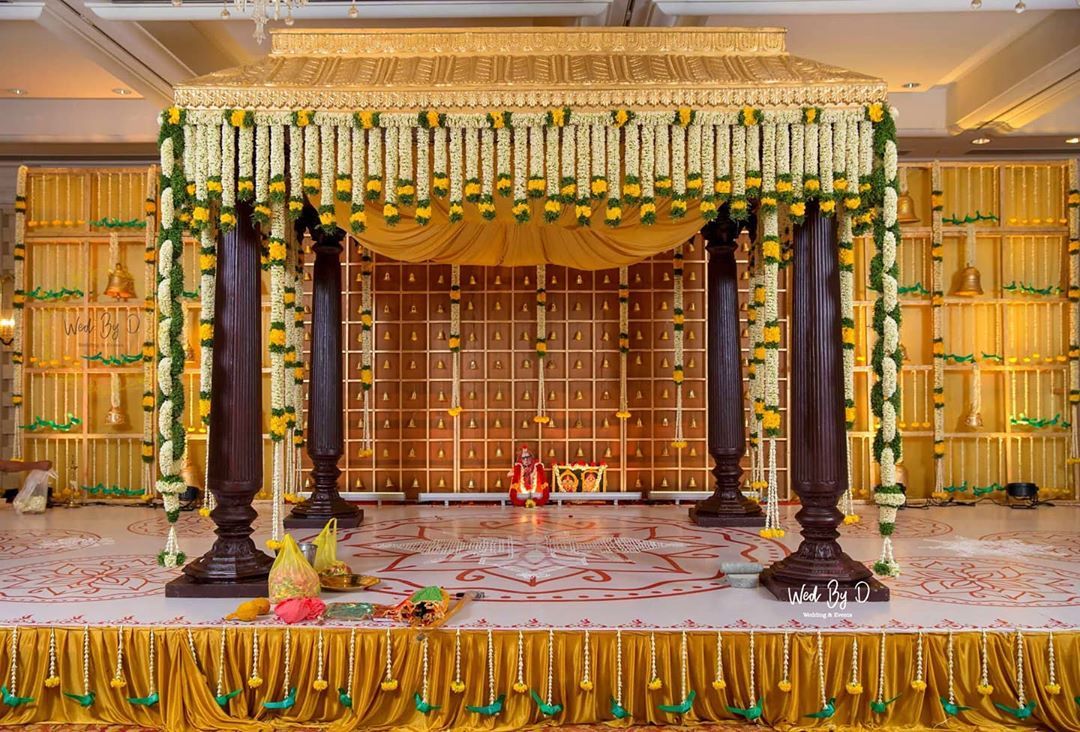Planning a wedding is an exciting and joyous journey that brings together families, friends, and loved ones to celebrate the union of two souls. Among the myriad of decisions to make, one of the most crucial aspects of wedding planning is choosing the perfect venue. For Indian weddings, which are known for their grandeur and cultural significance, the venue plays a pivotal role in setting the tone for the entire celebration. In this blog, we’ll walk you through an elaborate wedding planning checklist focused on Indian wedding venue planning.
The key points to remember
- Wedding hall booking has evolved from deciding the wedding date to booking the hall or hotel based on available dates. Today, weddings are more often held in mandapams, which are larger gathering spaces for the bride and groom. Both mandapams and hotels offer convenience and advantages for families.
- To choose the right mandapam or hotel, it is important to have a good wrap-up with wedding managers and staff, such as providing uniforms for workers to wear during the event. The hall seating capacity, dining capacity, and check-in rooms should be considered. The stage direction is also crucial when choosing a mandapam or hotel.
- Planning for the mandapam includes packing boxes and tape and taking pictures of Kuladeivam, Ishtadeivam, Guru Parambarai, and ancestors. If the wedding is held in a mandapam, ensure the kitchen, common restrooms, perishables store room, ramp for elderly people, and wheelchair availability. Check the morning hot water, solar system capacity, electrical items, and bed covers for cleanliness.
- Ensure the EB meter is working and the cordless microphone is working. Check the parking facility and arrange for security and valet parking drivers if needed. A separate lock and key should be available in each room. If planning a mapillai alaipu or barath in the city, obtain permission from a nearby police station. If the crowd increases, check the mandapam’s refund policy to ensure it is not a cancellation policy. Trust Mandapams do not have cancellation policies.
Determine the budget
- Before diving into the world of wedding venues, it is essential to set a realistic budget. Indian weddings can be elaborate affairs, so knowing how much you can allocate to the venue will help narrow down your options and prevent overspending.
Create a Guest list
- The number of guests you invite will significantly impact your choice of venue. Create a preliminary guest list to get an idea of how much space you will need and to ensure that your selected venue can comfortably accommodate everyone.
Think about the location
- It is critical to select the best location for your Indian wedding event.Consider factors such as accessibility, proximity to transportation hubs, and the convenience of your guests. Additionally, think about the climate during your wedding season, as outdoor weddings may not be feasible during extreme weather conditions.
Define the Wedding style
- Indian weddings come in various styles and themes, from traditional to modern, and each demands a specific kind of venue. Whether you’re envisioning a royal palace, a beachfront resort, or a charming garden, align the venue style with the overall theme of your wedding.
Venue Capacity and Layout
- Understanding the venue’s capacity and layout is essential to ensure that it can comfortably accommodate all the wedding rituals, ceremonies, and entertainment planned for your special day. Enquire about the seating arrangement, dance floor space, and the provision of separate areas for various events.
Inquire about Services and amenities
- Indian weddings often require a wide range of services and amenities, such as catering, decor, lighting, sound, and parking facilities. Verify with the venue management if they provide these services in-house or if they have preferred vendors they work with.
Review Venue Restrictions
- Different venues may have varying policies and restrictions, such as noise curfews, decoration guidelines, and outside vendor limitations. Ensure you are aware of these restrictions to avoid any last-minute surprises.
Plan for Accommodation
- If any of your guests are traveling from out of town, consider choosing a venue that offers accommodation options or has hotels in close proximity to the wedding location. Block rooms in advance to ensure availability and possible discounts.
Visit the Shortlisted venues.
- Once you’ve narrowed down your list of potential venues, schedule visits to each of them. Walking through the spaces will give you a better sense of the ambiance, aesthetics, and overall vibe, allowing you to make an informed decision.
Analyze the costs and contracts
- Obtain detailed cost estimates from each venue, including any additional charges for extra services. Review the contracts thoroughly to understand all the terms and conditions, payment schedules, and cancellation policies.
Discuss Backup plans
- While everyone hopes for perfect wedding day weather, it’s always wise to have a backup plan in case of rain or any other unforeseen circumstances. Discuss with the venue manager contingency options for outdoor weddings.
Seek Recommendations and Read reviews
- Ask friends, family, or wedding planners for recommendations based on their experiences. Additionally, read online reviews to gain insights into the experiences of other couples who have celebrated their weddings at your shortlisted venues.
Choosing the perfect venue for your Indian wedding is a significant decision that will shape the overall experience for you, your partner, and your guests. By following this comprehensive wedding planning checklist, you’ll be well-equipped to make an informed choice and create lasting memories in a space that resonates with your vision and cultural significance. Happy wedding planning, and best wishes for a joyous celebration of love and togetherness!




